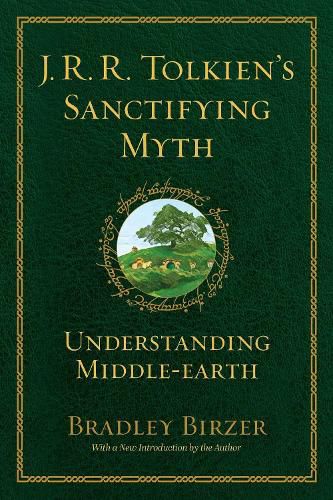Readings Newsletter
Become a Readings Member to make your shopping experience even easier.
Sign in or sign up for free!
You’re not far away from qualifying for FREE standard shipping within Australia
You’ve qualified for FREE standard shipping within Australia
The cart is loading…






With a new introduction by the author
Peter Jackson's film version of J.R.R. Tolkien's Lord of the Rings trilogy - and the accompanying Rings-related paraphernalia and publicity - has played a unique role in the disemmination of Tolkien's imaginative creation to the masses. Yet, for most readers and viewers, the underlying meaning of Middle-earth has remained obscure. Bradley Birzer has remedied that with this fresh study. In J.R.R. Tolkien's Sanctifying Myth: Understanding Middle-earth, Birzer reveals the surprisingly specific religious symbolism that permeates Tolkien's Middle-earth legendarium. He also explores the social and political views that motivated the Oxford don, ultimately situating Tolkien within the Christian humanist tradition represented by Thomas More and T.S. Eliot, Dante and C.S. Lewis. Birzer argues that through the genre of myth Tolkien created a world that is essentially truer than the one we think we see around us everyday, a world that transcends the colorless disenchantment of our postmodern age.
$9.00 standard shipping within Australia
FREE standard shipping within Australia for orders over $100.00
Express & International shipping calculated at checkout
With a new introduction by the author
Peter Jackson's film version of J.R.R. Tolkien's Lord of the Rings trilogy - and the accompanying Rings-related paraphernalia and publicity - has played a unique role in the disemmination of Tolkien's imaginative creation to the masses. Yet, for most readers and viewers, the underlying meaning of Middle-earth has remained obscure. Bradley Birzer has remedied that with this fresh study. In J.R.R. Tolkien's Sanctifying Myth: Understanding Middle-earth, Birzer reveals the surprisingly specific religious symbolism that permeates Tolkien's Middle-earth legendarium. He also explores the social and political views that motivated the Oxford don, ultimately situating Tolkien within the Christian humanist tradition represented by Thomas More and T.S. Eliot, Dante and C.S. Lewis. Birzer argues that through the genre of myth Tolkien created a world that is essentially truer than the one we think we see around us everyday, a world that transcends the colorless disenchantment of our postmodern age.